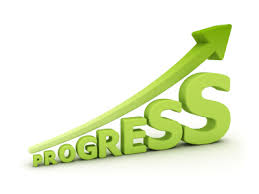progress
英 [ˈprəʊ.ɡres]
美 [ˈprɑː.ɡres]
- n. 进步,发展;前进
- vi. 前进,进步;进行
- n. (Progress)人名;(赞)普罗格雷斯
使用频率:

中文词源
progress 前进,进步,进展
来自pro-,向前,朝向,-gress,走,词源同grade,aggressive.
英语词源
- progress
-
progress: [15] Progress is one of a large family of English words (including also grade, gradual, transgress, etc) that go back to Latin gradus ‘step’. From it was derived the verb gradī ‘go, step’, which in combination with the prefix prō- ‘forward’ produced prōgredī ‘go forward’. English gets progress from its past participle prōgressus.
=> grade, gradual, ingredient, regress, transgress - progress (v.)
- 1590s in the literal sense; c. 1600 in the figurative sense, from progress (n.). OED says the verb was obsolete in English 18c. but was reformed or retained in America and subsequently long regarded in Britain as an Americanism. Related: Progressed; progressing.
- progress (n.)
- late 14c., "a going on, action of walking forward," from Old French progres (Modern French progrès), from Latin progressus "a going forward," from past participle of progredi (see progression).
In early use in English especially "a state journey by royalty." Figurative sense of "growth, development, advancement to higher stages" is from c. 1600. To be in progress "underway" is attested by 1849. Progress report attested by 1865.
权威例句
- 1. His remedial teacher sees signs of progress in his reading and writing.
- 他的辅导教师发现了他在阅读和写作方面进步的迹象。
- 2. Middle East peace talks in Washington showed signs of progress yesterday.
- 昨天在华盛顿举行的中东和谈有了取得进展的迹象。
- 3. Social progress is normally a matter of struggles and conflicts.
- 社会进步通常是斗争和冲突的结果。
- 4. The formalization of co-operation between the republics would produce progress.
- 正式确立合作关系将会促进共和国之间合作的顺利进展。
- 5. The diaries are a mixture of confession, work in progress and observation.
- 这些日记里既有自白,也有当下工作记录,还有见闻评论。